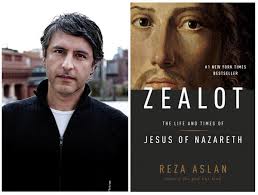THEOLOGY & APOLOGETICS
Review: "Zealot: The Life and Times of Jesus of Nazareth"
By Dan Barkman

Zealot promotes the tired bifurcation between the "Jesus of history" and "the Christ of faith." The former being what can be uncovered about Jesus using the historical method and the latter being the object of Christian devotion. However, Aslan never seriously engages with arguments that the two may not be that far apart. The idea that Jesus' teachings and miraculous deeds were the impetus for the early church's evangelism and courage in the face of persecution is given little credence.
To say that the author is involved in cherry picking his sources would be an understatement. As several reviewers have noted, Aslan treats the gospels as reliable history when it fits his theory but dismisses them as factually inaccurate and overlaid with legendary embellishment when they do not. He doesn't seem to employ any objective criteria by which he judges historicity (aside from whether it comports with his thesis). In addition, he confidently tells us that the apostles were illiterate peasants without acknowledging that this is a hotly contested point. He also fails to distinguish between the ability to read basic texts and the various degrees of writing literacy present in 1st century Galilee. It is not at all clear that tax collectors (Matthew) and businessmen (Peter) could have functioned in their professions without at least being semi-literate. The author assures us that, with the possible exception of the Gospel of Luke, none of the traditional gospel authorship attributions are correct. However, if the early church felt free to assign false titles to the gospels, a relatively obscure figure like Mark probably would not have been at the top of the list.
There are several factual inaccuracies as well. We are told that our earliest gospel, the Gospel of Mark, has nothing to say about Jesus' resurrection. However, we were not informed that Jesus predicts His resurrection several times in the Markan narratives (Mark 8:31; 9:9, 9:31; 10:34; 14:28) and that Mark obviously knows of Jesus' post-resurrection appearances as he foreshadows them at the end of his gospel (Mark 16:7). Moreover, we are confidently told that even Luke never referred to Paul as an apostle despite Luke's comment to the contrary (Acts 14:14).
Aslan's dating of the gospels is equally problematic. He assigns Mark to the early 70's, Matthew and Luke to the 90's, with the Gospel of John being composed well into the 2ndcentury. But there are sound reasons for thinking that all three synoptic gospels were penned by the early 60's—well within the lifetime of eyewitnesses and contemporaries of the events described. And even his late dating of the fourth gospel is not typical of most Johannine scholarship.
While the book is well written and is certainly engaging, this work contains no compelling alternative to the portrait of Jesus that has been held by Christians for nearly 2,000 years. Aslan has failed to provide any good reason to believe that the "Christ of faith" is substantially different from the Jewish carpenter who walked the streets of 1st century Israel.
comments powered by Disqus
Published 9-3-13

